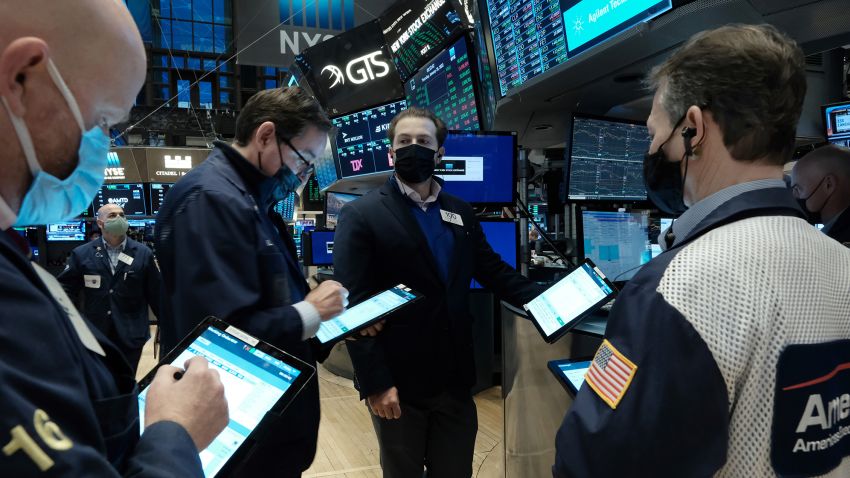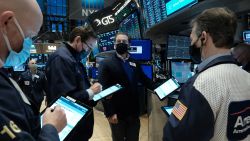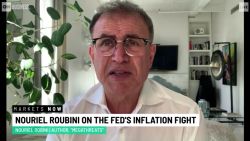This week’s market turmoil may feel like a shock. But many economists say the shocking thing is that it didn’t happen sooner.
A lot has happened in just three weeks since the market’s peak on January 3. Stocks have tumbled 10% into a correction, and after a brief, stunning rebound Monday, investors weren’t done selling. Trading on Tuesday was another rollercoaster ride, with the S&P 500, Dow and Nasdaq Composite all finishing in the red. Now stocks are up again Wednesday, pinning hopes on the Fed taking a softer tone on inflation. Don’t count on that.
The response from many analysts to the January selloff can be summed up like this: Everybody calm down.
“A combination of technical indicators…suggest we could be in the final stages of this correction,” JPMorgan economists wrote Monday.
Why this feels new, but isn’t
Indeed, corrections are typically short-lived events that happen a couple of times a year. But over the past two years, equities have been largely insulated by a flood of easy money from the Federal Reserve: a double-barrel policy of near-zero interest rates and bond buying that has kept financial markets climbing in an almost continuous straight line since the spring of 2020.
But the Fed is unwinding that support now, and it’s widely expected to raise interest rates to tackle inflation starting in March.
Although the intraday swings — such as Monday’s more than 1,000 point reversal on the Dow — are surprising, even scary, it’s not a time to panic.
“We think these are very logical responses to this whole set of variables that the markets are facing facing,” says Matt Forester, chief investment officer of Lockwood Advisors at BNY Mellon Pershing.
And LPL Financial strategist Jeff Buchbinder notes that on average, the S&P 500 has fallen 5% or more three times each year, plus one correction of at least 10%. So after huge gains in 2021, and only one 5% drop all year, “we were due for a dip,” he says.
What’s worrying investors
The primary cause of the market jitters lies with the Federal Reserve, which widely expected to begin raising interest rates in March to try to rein in inflation. Although that’s not unexpected, the central bank’s tone has turned decidedly more hawkish.
“The Fed has clearly changed its tune quite a bit,” Forester says, adding that market participants shouldn’t be surprised at the outsize effects on markets when the Fed takes away the punch bowl.
Adding to the nerves on Wall Street are a mixed bag of corporate earnings and the growing threat of war in Eastern Europe — which, among other things, could disrupt the flow of crucial energy supplies.
How to be zen
Historically, corrections are viewed as healthy: The market is taking a breather and reassessing valuations that had gotten out of hand. But after two years without one, the drop can feel jarring, as anyone looking at their 401(k) in the past few weeks understands all too well.
Maybe just forget your 401(k) password for a while. Most economists aren’t sweating the January selloff. Some are even relieved.
“The long overdue equity market correction has finally begun,” said Steven Ricchiuto, US chief economist at Mizuho Securities, on Monday. “In our view, this is a healthy long-term development.”
Mark Zandi, chief economist at Moody’s Analytics, said the market retreat is a feature, not a bug, of the Fed’s shift to inflation-fighting mode.
“So far, I view this as therapeutic,” Zandi said. “The Federal Reserve wants and needs the economy to cool off, otherwise it will blow past full employment and inflation will become a persistent problem.”
What could go wrong?
Of course, corrections are healthy within reason — that is, as long as they don’t spiral into panic. So far, the S&P 500 is nowhere near the 20% threshold that would be considered a bear market.
And not all economists share Zandi’s optimism.
Jeremy Grantham, co-founder and chief investment strategist of Grantham, Mayo, & van Otterloo believes stocks are in a “superbubble” that, like most bubbles, won’t end well. Many investors don’t want to believe that the stock market is overdue for a broader pullback, because, well, it’s a bummer.
“In a bubble, no one wants to hear the bear case. It is the worst kind of party-pooping,” Grantham wrote. “For bubbles, especially superbubbles where we are now, are often the most exhilarating financial experiences of a lifetime.”
This could be the beginning of a bear market. Only time will tell. But if you’re considering a panic sale, keep this in mind: If you had sold an S&P 500 index-traded fund during the last bear market in March 2020, you would have missed out on a 100% gain. Yes, stocks have doubled since then.
Forgetting that 401(k) password may not be such a bad idea, after all.
—CNN Business’ Matt Egan, Paul R. La Monica and Julia Horowitz contributed to this article.





















